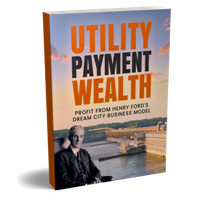
At the time of his remark, Emanuel was eager to exploit the 2008 financial crisis to raid the public treasury. With the passage of the American Recovery and Reinvestment Act in February 2009, Emanuel’s wish was granted. The Obama administration had the opportunity to do big things.
Politically, the passage of the Recovery Act was a huge success. Washington was able to dole out funds to their preferred projects like never before. What could be better for a Congressman than to direct massive amounts of funds to infrastructure, healthcare, energy, security, law enforcement, and just about everything else?
Some Congressman even directed money to bridges and buildings that were then named after them. No doubt, this flattered their egos. But what it really did was memorialize their political swindle.
Economically, the Recovery Act was a great big dud. The money was frittered away without producing any lasting wealth. However, it did produce lasting debt. Since the Recovery Act’s passage, the U.S. national debt has nearly doubled from roughly $10.6 trillion to nearly $20 trillion.
Squib Kicking the Debt Ceiling Can
Several weeks ago we scribbled an article detailing why there will be no 11th hour debt ceiling deal. We thought we were really on to something. We even followed it up with a similarly themed article, calling Mitch McConnell’s debt ceiling bluff.
This week we were reminded that, like Socrates, “We know that we know nothing.” For on Wednesday, President Trump squib kicked the debt ceiling can across the aisle into the outstretched hands of Senate Minority Leader Chuck Schumer and House Minority Leader Nancy Pelosi. This came less than an hour after House Speaker Paul Ryan called the Schumer and Pelosi proposal “ridiculous and disgraceful.”
The Hurricane Harvey crisis, and the popular support for relief aid, provided Trump the opportunity he needed to reach an expedient, yet short-term, extension of the debt limit. Come mid-December, he’ll likely regret his decision. Mitch McConnell offered a small elaboration:
“[The President’s] feeling was that we needed to come together to not create a picture of divisiveness at a time of genuine national crisis, and that was the rationale.”
What to make of it? U.S. stock markets were tickled pink. After a brief panic on Tuesday, the DOW, S&P 500, and NASDAQ all closed Wednesday higher than where they started. Yesterday, these markets closed about where they opened.
From a broader perspective, aside from digging a deeper hole that the American people will have to eventually dig their way out of, what does the debt ceiling extension really accomplish?
For one thing, the debt ceiling extension brought clarity. It elucidated that the faux appearance of fiscal responsibility that a debt ceiling projects is no longer needed. Thus, President Trump wants to end the debt ceiling all together.
The Government Debt Paradox: Pick Your Poison
Of all modern economic dogmas, perhaps the most broadly accepted is the belief that the government can spend the economy to growth using debt. Certainly, government spending redirects economic growth to government preferred industries. So, too, when government spending is financed via deficits, it grows inflation.
But government stimulus doesn’t grow the economy. How could it? Aside from reams of legislation, levies, and fees, the government doesn’t produce a doggone thing.
To the contrary, the government usurps capital and uses it in ways that it otherwise wouldn’t be. Specifically, the government uses its heavy hand to distribute capital in ways that absent coercion, people wouldn’t pay for. These generally equate to value subtracting endeavors.
For example, last month we learned that a foreign company hired by the U.S. government ran up a $50 million tab on luxury cars, weapons, and booze to mentor Afghan intelligence officers. Was this a good investment? Does it provide some benefit, financial or otherwise, for U.S. taxpayers? Did someone at least have a little fun at the public’s expense?
In addition, value subtracting endeavors like these have the effect of attracting dependents. Some become hooked on direct transfer payments, like monthly welfare and disability checks. Others become hooked on the fat government contracts for their daily bread.
Over the decades, the entire economy’s been warped by the constant expansion of government debt. Take it away, and the economy crumbles. Continue its current trajectory and the economy blows up.
That’s the government debt paradox we presently live with. Pick your poison. Enjoy the ride!
Sincerely,
MN Gordon
for Economic Prism
Return from The Government Debt Paradox: Pick Your Poison to Economic Prism





Pingback: America Is Going Broke At Mach 30 "And No One Cares" | StockTalk Journal
Pingback: America Is Going Broke At Mach 30 “And No One Cares” | Black Swan Alert
Pingback: America Is Going Broke At Mach 30 "And No One Cares" | WarMachines.com
Pingback: America Is Going Broke At Mach 30 “And No One Cares” – Independent News Media
Pingback: To Hell In A Bucket |
Pingback: US Debt: To Hell In A Bucket snbchf.com
Pingback: Why The US Federal Debt Isn't Sexy Enough To Carry Interest With The Voter, And The Politicians Know It